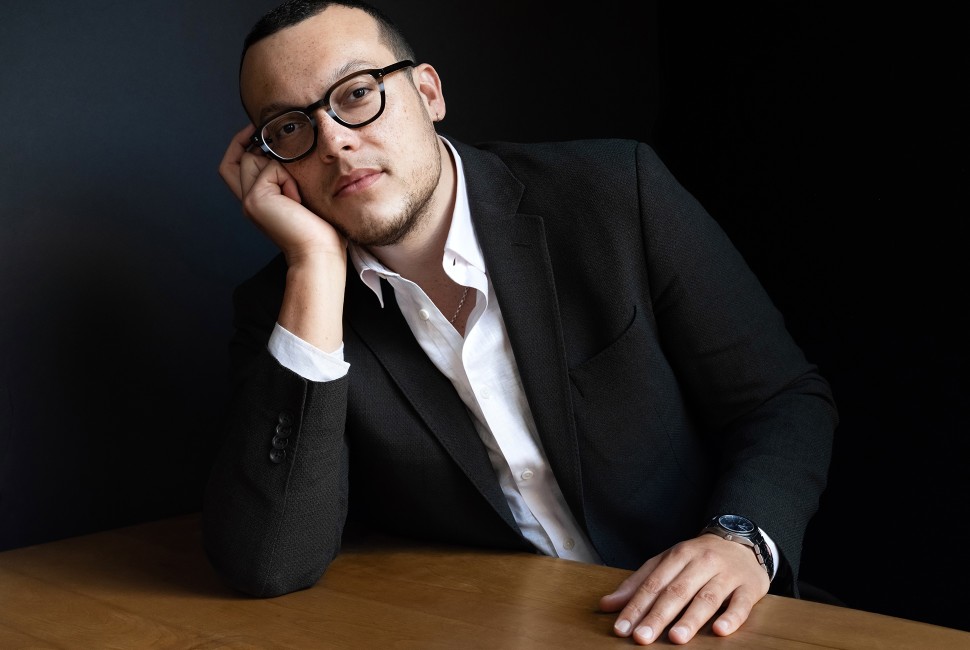April is National Poetry Month. To celebrate, Northwestern Now sought out Charif Shanahan, assistant professor of English at Weinberg College of Arts and Sciences, to discuss the craft of poetry as a tool for knowledge generation and the rewards of writing and reading it.
Shanahan recently was honored with the 2024 Whiting Award in Poetry for his second book of poems, “Trace Evidence” (Tin House, 2023). The highly selective $50,000 award recognizes writers for their early accomplishments and promise of great work to come. Past recipients have gone on to win top literary awards including the Pulitzer Prize, the National Book Award and PEN awards.
“Trace Evidence” also has been recognized by several prestigious literary foundations. The collection was longlisted for the 2023 National Book Award; was a finalist for the 2024 National Book Critics Circle and the Kingsley Tufts Poetry awards; is a finalist for the Lambda Literary Award in Gay Poetry and the Publishing Triangle’s Thom Gunn Award, and topped The Guardian list of best poetry books of 2023.
Shanahan happened to arrive at Northwestern during the height of the pandemic in 2020 as he was growing, shaping and editing the poems that would become “Trace Evidence.”
The youngest of three sons, Shanahan was born in the Bronx to a Moroccan mother and Irish American father. On his father's side his heritage is third-generation white Irish American from New York City. His mother was born in Casablanca and raised in a family at the intersection of Arabness and Blackness. This combination of cultures, race, nationality and queer identity has been the wellspring of his poetry and creative practice.
“Inhabiting the interstices — racially, culturally — required me to look hard at the world in an effort to understand the reasons, both historical and current, for that ‘positioning’,” Shanahan said. “It has also been enormously generative creatively.”
The book’s probing center poem, “On the Overnight from Agadir,” which tracks his quest to locate himself in his mother’s homeland, also explores a devastating bus accident he survived while conducting genealogical research as a Fulbright Senior Scholar in Morocco.
Shanahan chose the title “Trace Evidence” because it works as both noun and verb, thing and action. It also references the language used at a crime scene.
“Trace evidence is generated by contact between surfaces, a drop of blood, or some DNA, and are the vestiges of what has occurred in the space,” Shanahan said. “It felt like an operative metaphor for thinking about race and identity in a postcolonial context and from a mixed-race perspective, and about what can be seen and what can’t be seen.”
In the Q&A, Shanahan talks about sources of inspiration, what poetry can teach us and how to approach a poem.
“Trace Evidence” captures moments from childhood to explore questions of identity. What makes memories a fruitful source for poetry?
Memory-driven poems are, in my view, less “about” the earlier moment and more about how the individual later in life has integrated, or not integrated, that memory into their understanding of themselves and human experience. The question is why a certain memory has stayed with you, what gives it life. The poem, if it does its work, can touch the answer to the question, which ideally then casts light on the questions of others.
What do you hope you do as well as your mentors?
It is important to me to convey the sense of discovery inherent to the process of making poems. When we sit down to write a poem and know exactly what we mean to say, the draft might be competent, but is usually dead on arrival, spiritually. I want my students to know that poetry enables them to discover the answers to questions that they may not have consciously known to ask, that, whatever those questions are, the answers are inside them. For students who won’t continue writing poems, I hope that they come to see the utility and relevance of poetry to their lives and will continue to be poetry readers.
Why do you take the risk to craft and deeply consider things when there is a possibility that people may misinterpret or miss the point?
The failures of language are exciting to me. It means that we are at the edge of something real and important that is hard to convey and therefore worth finding a way to transmit. The difficulty of its expressability is related to its particularity, its value, its worth. As a poet, I’m inspired when I arrive at a place where language fails because it means something is there worth discovering and giving shape to through the means of poetry.
For those who are resistant and feel like poems are too abstract, what's your guidance for reading poetry?
There are so many kinds of poems. Some are immediate and clear and accessible and want to be understood, known, seen, even useful. We might not entirely understand a poem when we first hear or read it, but we can still take something from it. It’s a cultivated misconception that poems are puzzles waiting to be “figured out”— poetry is the human voice, and all we’re being asked to do — at first, at least — is listen.


